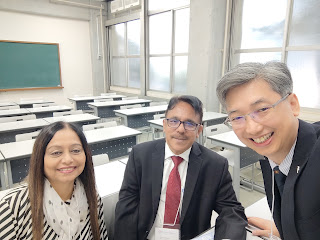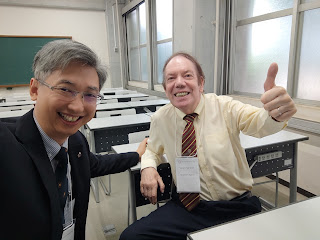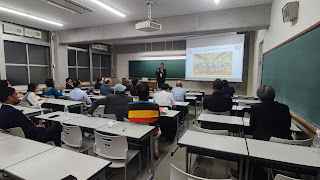Asian
Network for Quality (ANQ) Congress 2024 was held by Japanese Society for
Quality Control (JSQC) in the Keio University, Yokohama, Japan from 16-20 Sep
2024. The congress theme was “Prosperity through Quality – Returning to
Origins, Leaping into the Future”. Day 1 of Congress is held on 18th
Sep 2024. After lunch, we went to the parallel session. I met Prof. Shu Yamada
in the parallel session and took a photo for memory.
I
met Dr. KATO Shogo (Associate Professor, Department of Informatics, The University
of Electro-Communications).
In
the session C1, I met Ms. Farhana Hussain and Mr. M.R. KABIR (President, BSTQM)
again. We met in ANQ Congress in Vietnam last year.
I
also met India team Mr. Ashok Sharma (IKA Silver medal awardee 2024), Dr. Prem
Motowani (Professor, Center for Japanese Studies, Jawaharlal Nehru University
& ANQ 2024 keynote speaker) and Mr. Janak Mehta (Former Chairman, ANQ).
Dr.
Roy Rimington (Vice-Chairman, SQI) also stayed in this session.
Before
the speaker presentation, Dr. Roland interviewed Dr. Nafiza
Islam (Associate Professor, Jahangirnagar University).
I
also took a photo with Dr. Nafiza Islam.
She
is the first speaker in this session and her topic named “Does Knowledge
Management Moderate the Relationship between Critical Factors of TQM and
Perceived Institutional Performance in Higher Education”. In the beginning, Dr.
Islam briefed the problem domain and statement such as unemployment problem,
constraints of intense competition, student satisfaction in higher education
and knowledge-driven sector.
Then
she explained the research gap and objective of her study. Dr. Islam also
mentioned the literature support TQM in Higher Education of Bangladesh.
Finally,
Dr. Nafiza Islam described framework of recommendation including top
management, faculty members, administration, stakeholder and regulatory bodies.
The
second speaker was Dr. Nguyen Thanh Tung (President, Knowledge Management
Institute, Vietnam) and his presentation entitled “Happiness at Work: Factors
Affecting Employees’ Happiness at Work”. Dr. Tung discussed what is Happiness
at works and quoted Lyubomirsky (2005) that involved Set Point (50%), Intention
Activity (40%) and Circumstances (10%).
Then
he employed the formula H = S + C + V where Happiness equal to the set point,
current work conditions and individual’s voluntary activities. He said we were
not able to change S but we could find ways to improve C and V variances.
Lastly,
Dr. Nguyen Thanh Tung found 10 factors related to Happy at works and concluded
that happiness at the person and group level is related to core and contextual
performance, customer satisfaction, safety, attendance and retention.
The
session chairlady Ms. Chisato Kajihara presented speaker certificate to Dr.
Tung.
The
third speaker was Mr. Tran Xuan Hong Hai (VQHT) and his presentation was “The
Influence of Attitude toward Entrepreneurship, Entrepreneurial Self efficacy, and
Perceived Behavioral Control on Vietnamese Students' Entrepreneurial Intentions”.
Firstly Mr. Hai introduced 3800 startups in Vietnam with 84 business incubators
and 35 business accelerators.
And
then Mr. Tran Xuan Hong Hai mentioned his research hypothesis that affected entrepreneurial
intentions.
Finally,
he showed the results and concluded that higher education should focus on
teaching and training students to develop the courage to face obstacles,
embrace challenges, take risks, and foster a desire for entrepreneurship.
During
the tea break, I took a photo with old and new friends.
(Left:
Dr. Roland K. Jahnke, Mr. Meng Ken Too (SQI), Dr. Kim Seungbeom (KSQM, Hongik
University), Mr. Cheong Weng Wai (Director, HALLBAR; Institute of Quality
Malaysia (IQM)), Dr. Gye-Soo Kim (KSQM, Semyung University) and I)
Minda
and I took a photo with Twinkle (CAQ).
In
Session C2, Dr. Akira OGAWA (Visiting Scholar, Mejiro University) was the first
speaker and I took a photo with him before the session start.
Dr.
Akira OGAWA’s topic named “Data science education using real teaching materials”.
Firstly, he briefed three fields in data science and they were Science,
Management and Technology.
Then
he briefed his previous study in TQM activities in 2014 using paper helicopter
project for design engineers. But rapid growth of technology and breakthrough
approach was needed that he started education for data science in 2024.
Lastly,
he employed coin shooting for problem solving to demonstrate the statistic
dispersion and deviation. Dr. Akira OGAWA concluded that solving the problems
could be done by utilizing PDCA cycle and reducing variability first.
Q&A
session, Minda asked question about reducing manpower. Dr. Akira OGAWA said to
use multi-skill engineers.
Ms.
Ryoko Shimono (Session chair) presented speaker certificate to Dr. Ogawa.
The
second speaker was Mr. Asano Masakazu and his presentation title was “An
Analysis of Behavioral Factors and Performance Based on Personnel Evaluation
Data”. He firstly briefed the background about developing of HR data
utilization and analytical technologies. His research was using evaluation data
on “Performance” and “Behaviors” over 3-year period in the organization.
Mr.
Masakazu found six relevant factors and they were “Comprehensive Behavior
Factor”, “Integrated Ethical Vision Factor”, “Job Behavior Factor”, “Dynamic
Leadership Factor”, “Integrated Management Factor” and “Development Leadership
Factor”. Finally, he concluded performer in three level (Low, Middle-Low &
Middle-High) that related to six factors.
The
last session I attended and would be presented was Session B3 – AI Issues which
was chaired by Mr. Chandra Mouli (ISQ).
Dr.
Gye-Soo Kim (KSQM, Semyung University) was the first speaker in this session
and his presentation named “AI Roles for Service Quality Innovations”. In the beginning,
Dr. Kim introduced his research objective to explore the challenges and ethical
considerations associated with AI implementation in service quality initiatives.
And
then Dr. Kim explained Service Quality Innovation in three element including service
quality inspection, service process inspection and service quality improvement.
Research
model was introduced and Dr. Kim found that this is difficult to distinguish
between the services provided by AI and the human service area due to the
integrated nature of call centers. Lastly, he concluded that Korea should focus
on AI.
The
second speaker was Ms. Nahima Sultana (Ex-Lecturer (Economics) at BMARPC,
BSTQM) and her topic was “AI Integration in Education: Ethical Considerations,
Continuous Learning Strategies, and Industry Partnerships”. In the beginning,
she briefed the fourth industrial revolution and impact on education.
And
then she discussed the benefits and risk of AI in Education that including
ethical consideration and continuous learning. Ms. Sultana also identified some
gaps and challenges such as Bias in AI algorithms.
Finally,
she concluded in three points that needed strategies for AI, establishing AI
governance frameworks, and providing resources.
Mr.
Chandra Mouli (ISQ) together with Prof. Kano together and Mr. M.R. KABIR to
present speaker certificate to Ms. Nahima Sultana.
Mr.
Too Meng Ken attended my session.
I
was the last speaker and my topic entitled “Preliminary Study of the
Integration Approach on AI Ethics and AI Management System”.
Firstly,
I briefed the AI Ethics and AI Safety that without unacceptable dangers both
long-term and short-term risks.
I
then presented some examples of AI deepfake journalism, including the Chief
Executive of HKSAR, Elon Musk, and then I presented my student group project that
they employed Trump to introduce their project.
After
that I showed my survey for students who tested by MIT moral machine for
decision after automotive car accidents and linked up with 8 ethics theories. It
observed three top theories students employed and they were Utilitarianism (30%),
Right (12%) and Kantian/Deontology (10%).
Finally,
ethical AI framework was introduced and integrated with ISO 42001 AI management
system for whole AI system life cycle.
Lastly,
I also invited my wife Minda and Prof. Kano to have group photo together.
At
the end, I presented HKSQ 35th anniversary book to the session chair
Mr. Chandra Mouli (ISQ).
Finished
day one activities, we took a group photo with session participants for memory.
Minda
and I went to the restaurant near the station to have dinner.
We
have good dinner!













































沒有留言:
發佈留言